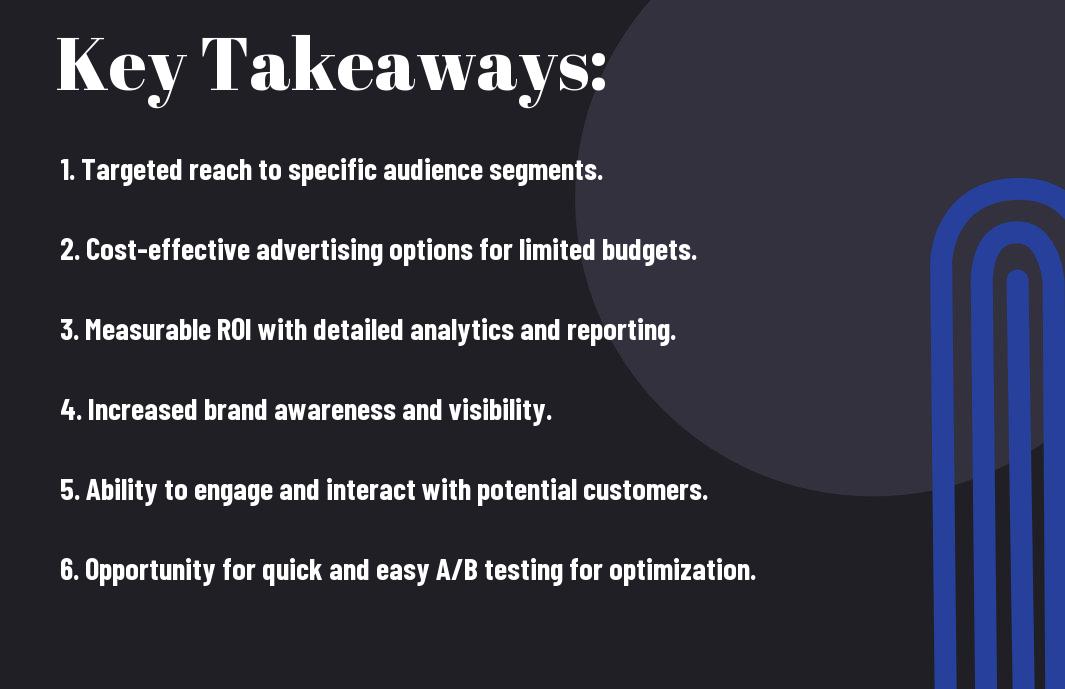Are you looking to expand your small business’s online reach and increase your sales? If so, Social Media Pay-Per-Click (PPC) advertising may be just what you need. By utilizing platforms such as Facebook, Instagram, Twitter, and LinkedIn, you can target specific demographics, increase brand awareness, and drive qualified traffic to your website. Compared to traditional advertising methods, Social Media PPC offers a cost-effective way to promote your products or services, with the ability to track and measure your success in real-time. In this blog post, we’ll explore the numerous benefits of Social Media PPC for small businesses, and provide you with the information you need to get started.
Key Takeaways:
- Targeted Advertising: Social media PPC allows small businesses to target specific demographics, interests, and behaviors, increasing the chances of reaching the right audience.
- Cost-Effective Marketing: With the ability to set a budget, small businesses can control their advertising costs and achieve a higher ROI compared to traditional marketing methods.
- Increased Brand Awareness: Utilizing social media PPC can help small businesses increase their brand visibility and reach a wider audience, ultimately leading to increased brand recognition.
- Engagement and Interaction: Social media platforms provide opportunities for small businesses to engage with their audience through comments, messages, and shares, fostering a sense of community and trust.
- Measurable Results: Social media PPC platforms offer robust analytics and reporting tools, allowing small businesses to track and measure the success of their campaigns and make data-driven decisions for future marketing strategies.

Advantages of Social Media PPC
Now, let’s dive into the numerous advantages that social media PPC can offer your small business. According to Top 10 Benefits of PPC for Your Business, PPC advertising on social media platforms can be highly beneficial for your business growth. Here are some of the key advantages you should consider.
Cost-Effectiveness
With social media PPC, you have full control over your advertising budget. You only pay when someone clicks on your ad, making it a cost-effective way to reach your target audience. Additionally, you can set daily or lifetime budgets, ensuring that you don’t overspend. You can also adjust your budget at any time based on your campaign performance, allowing you to maximize your ROI.
Targeted Reach
One of the most significant advantages of social media PPC is the ability to target your ads to specific demographics, interests, and behaviors. This targeted approach ensures that your ads are seen by the right people, increasing the likelihood of engagement and conversions. You can also retarget users who have previously interacted with your business, further improving your chances of driving conversions.
Flexibility and Scalability
Social media PPC offers unparalleled flexibility and scalability in comparison to traditional advertising methods. You have the freedom to create and launch ad campaigns quickly, allowing you to respond to market changes and trends in real-time. Moreover, you can scale your campaigns based on their performance, expanding your reach as your business grows.
Real-time Analytics and Feedback
With social media PPC, you gain access to real-time analytics that provide valuable insights into your ad performance. You can track metrics such as clicks, impressions, and conversions, allowing you to optimize your campaigns for better results. Additionally, you receive instant feedback on your ads, enabling you to make data-driven decisions to refine your advertising strategy.
Brand Building and Customer Loyalty
Social media PPC presents an opportunity to enhance your brand’s visibility and credibility. By consistently reaching your target audience with compelling ads, you can establish brand recognition and trust. Moreover, PPC campaigns can help foster customer loyalty by engaging with your audience and providing them with valuable content, ultimately leading to repeat business and referrals.
By harnessing the power of social media PPC, you can effectively reach and engage with your target audience, driving meaningful results for your small business. With its cost-effectiveness, targeted reach, flexibility, real-time analytics, and brand-building capabilities, social media PPC is a valuable tool to propel your business growth.
Strategies for Implementing PPC Campaigns
Unlike organic social media posts, PPC campaigns require a strategic approach to maximize the benefits for your small business. Here are some key strategies to consider when implementing your PPC campaigns:
Identifying Objectives and Goals
Before launching a PPC campaign, it’s crucial to identify your objectives and goals. What are you aiming to achieve with your campaign? Whether it’s increasing website traffic, generating leads, or boosting sales, setting clear and measurable goals will guide your campaign strategy and help you track its success.
Crafting Compelling Ad Content
Creating compelling ad content is essential for capturing the attention of your target audience. Your ad copy should be concise, persuasive, and relevant to your target market. Incorporating strong calls to action and highlighting the most important benefits of your products or services will encourage users to click on your ad and take action.
Audience Segmentation and Targeting
Segmenting your target audience and tailoring your ad content to specific demographics, interests, and behaviors can significantly improve the effectiveness of your PPC campaigns. By targeting the right audience with the right message, you can increase the relevance of your ads and drive higher conversion rates, leading to a more positive ROI for your small business.
Budgeting and Bidding
Setting a budget and determining your bidding strategy is crucial for managing your PPC campaign effectively. Whether you opt for manual or automated bidding, it’s important to allocate your budget wisely and monitor your campaign performance closely. Overbidding can deplete your budget quickly, while underbidding may result in missed opportunities. Finding the right balance and optimizing your bidding strategy based on performance data will help you maximize the impact of your PPC campaigns.

Common Pitfalls and How to Avoid Them
For more information on the benefits of PPC for small businesses, you can refer to this comprehensive article on 3 Benefits of PPC For Small Businesses – Addison Clark. However, it’s essential to be aware of the common pitfalls associated with social media PPC and how to avoid them.
Poor Audience Targeting
One of the most common mistakes in PPC campaigns is poor audience targeting. It’s crucial to identify your target audience and tailor your ads to their interests and demographics. Failure to do so can result in wasted ad spend and low conversion rates. Make use of the targeting options available on social media platforms to reach the right audience for your business.
Ineffective Ad Copy
Your ad copy plays a significant role in the success of your PPC campaign. Ineffective ad copy can fail to grab the attention of your audience and convey your message clearly. Compelling ad copy should be concise, engaging, and capable of encouraging action. A/B testing different ad copies can help you identify the most effective messaging for your audience.
Neglecting Mobile Optimization
With a large portion of internet users accessing social media platforms on their mobile devices, neglecting mobile optimization can be detrimental to your PPC campaign. Make sure your landing pages and ad creatives are optimized for mobile viewing to provide a seamless experience for mobile users. Failure to do so can result in high bounce rates and low conversion rates from mobile traffic.
Failing to Monitor and Adjust Campaigns
Once your PPC campaigns are live, it’s crucial to continuously monitor their performance and make necessary adjustments. Failure to monitor and adjust your campaigns can lead to inefficient spending and missed opportunities for improvement. Keep a close eye on key performance metrics such as click-through rates, conversion rates, and cost per acquisition, and make adjustments to optimize your campaign performance.
Success Stories
Keep in mind that the use of social media PPC for small businesses has resulted in numerous success stories. These businesses have been able to achieve significant growth and success through the strategic use of social media advertising. Here are a few examples of how small businesses have benefited from PPC campaigns on platforms such as Facebook, Instagram, and Twitter.
Case Studies of Small Business Wins
When considering the impact of social media PPC on small businesses, it’s important to look at real-life examples of success. Here are a few case studies that demonstrate the potential for growth and success through PPC advertising:
- Case Study #1: A local bakery saw a 30% increase in online sales after running a targeted Facebook ad campaign that promoted their new line of gluten-free pastries to the local community.
- Case Study #2: A boutique clothing store experienced a 50% increase in foot traffic to their physical location after running a series of Instagram ads highlighting their unique product offerings.
- Case Study #3: A small tech startup saw a 70% increase in website traffic after launching a Twitter ad campaign targeting industry-specific keywords and hashtags.
Lessons Learned from PPC Campaigns
When diving into the world of social media PPC for your small business, it’s important to learn from the experiences of others. You can avoid common pitfalls and capitalize on proven strategies by understanding the following lessons learned from successful PPC campaigns:
- Targeting: It’s crucial to define and target your specific audience to maximize the effectiveness of your ads.
- Testing and Optimization: Constantly test and optimize your ad campaigns to ensure you are getting the best results for your investment.
- Engaging Content: Creating visually appealing and compelling ad content is key to capturing the attention of your audience.
The Benefits of Social Media PPC for Small Businesses
Now that you understand the numerous benefits of utilizing social media PPC for your small business, it’s time to put this knowledge into action. By investing in targeted advertising on platforms like Facebook, Instagram, and Twitter, you can significantly increase your brand’s visibility, reach new customers, and drive more traffic to your website. With the ability to set specific targeting parameters and closely track the performance of your ads, social media PPC allows you to make the most of your marketing budget and maximize your return on investment. Don’t miss out on the potential growth and success that social media PPC can bring to your small business. Start harnessing the power of targeted digital advertising today!
FAQ: The Benefits of Social Media PPC for Small Businesses
Q: What is social media PPC?
A: Social media PPC (Pay-Per-Click) is a form of online advertising where businesses can display ads on social media platforms and pay a fee each time their ad is clicked. This allows small businesses to reach their target audience and increase brand awareness through targeted advertising campaigns.
Q: How can social media PPC benefit small businesses?
A: Social media PPC offers several benefits for small businesses, including increased brand visibility, targeted audience reach, cost-effective advertising, and the ability to track and measure campaign performance. By utilizing social media PPC, small businesses can effectively compete with larger competitors and reach potential customers on a limited budget.
Q: Which social media platforms offer PPC advertising for small businesses?
A: Popular social media platforms such as Facebook, Instagram, Twitter, LinkedIn, and Pinterest all offer PPC advertising options for small businesses. Each platform provides unique targeting and ad placement options, allowing businesses to tailor their campaigns to their specific audience and marketing goals.
Q: How can small businesses maximize the effectiveness of social media PPC?
A: To maximize the effectiveness of social media PPC, small businesses should conduct thorough audience research, create compelling ad content and visuals, utilize advanced targeting options, and continually analyze and optimize their campaigns. By implementing best practices and staying abreast of the latest trends, small businesses can ensure their social media PPC efforts are successful.
Q: What are the potential drawbacks of social media PPC for small businesses?
A: While social media PPC offers numerous benefits, potential drawbacks for small businesses include the risk of overspending on ineffective campaigns, the need for constant monitoring and optimization, and the possibility of ad fatigue among targeted audiences. It’s crucial for small businesses to carefully plan and manage their social media PPC campaigns to mitigate these potential drawbacks and achieve the best results.



